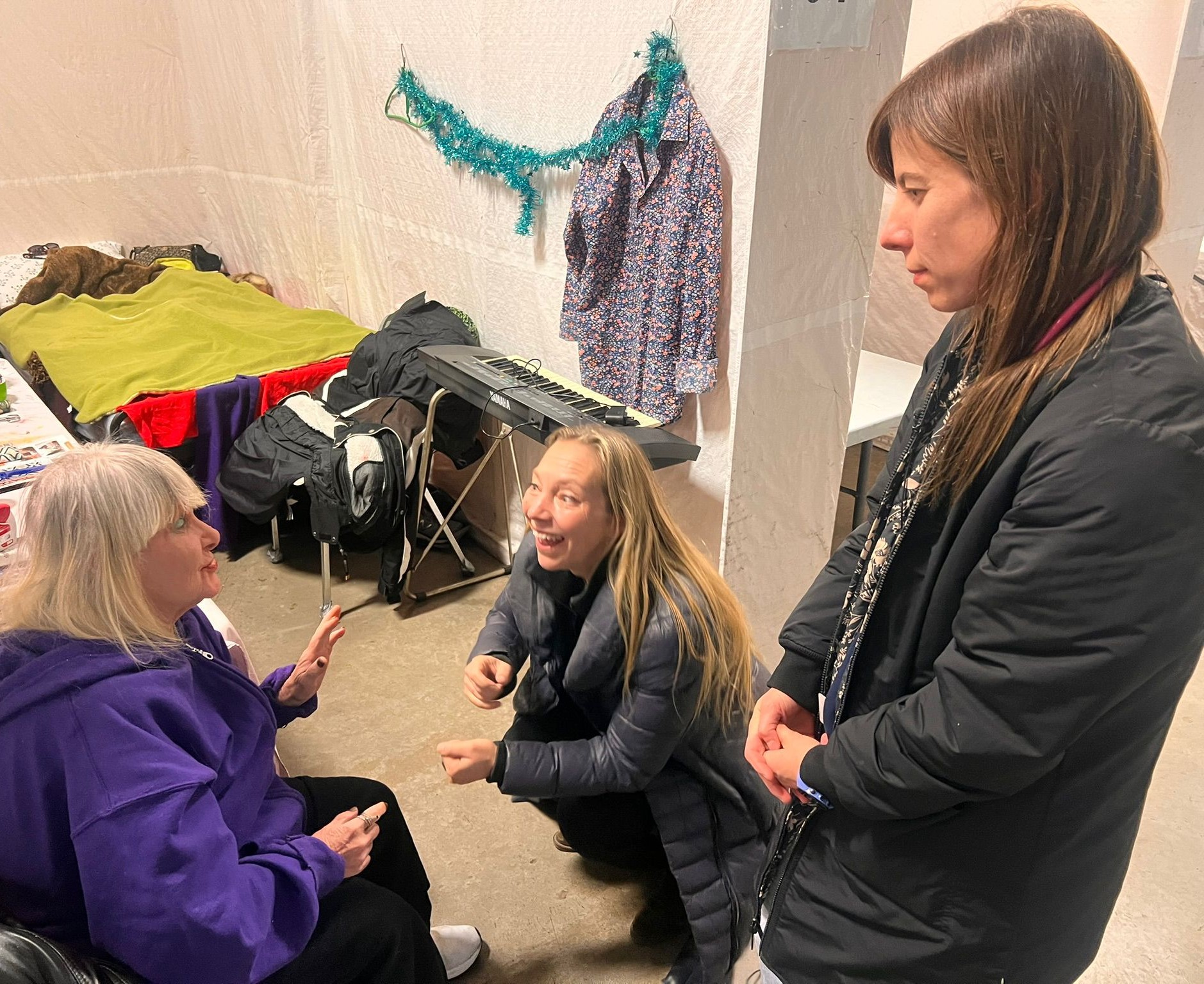When you think of seniors living out their final days, you probably don’t think of them doing that in a homeless shelter.

That is the reality for countless Montrealers, however, including 72-year-old Diane Gagné. Gagné is battling an aggressive terminal cancer while living in an old arena in Hochelaga-Maisonneuve that’s been transformed into a shelter for the unhoused.
Even as she struggles through piercing pain and breathing difficulties, she perks up as her doctor, Marie-Hélène Marchand, pays her a visit, accompanied by a nurse.
“I’m all alone in this world. I’m gonna die all alone, but these two lovely people said they’re gonna hold my hand,” Gagné told Global News.
Gagné says she has been living at the shelter for about a year, ever since she lost her spot in social housing. She grew up in downtown Montreal and in Pointe-Saint-Charles. She says her mother died young, and she has no relationship with her family.
Story continues below advertisement“When I got to know her and her disease, I was astonished that she was living here,” said Isabelle Leblanc, a friend of Gagné’s, who is also living at the shelter.
Gagné is among the roughly 50 patients experiencing homelessness that Marchand regularly visits as part of Projet Maison Mobile.

Get weekly health news
Receive the latest medical news and health information delivered to you every Sunday. Sign up for weekly health newsletter Sign Up By providing your email address, you have read and agree to Global News' Terms and Conditions and Privacy Policy.A similar program is active in Toronto, but Marchand is the first to implement a palliative care program for the unhoused in Quebec.
More on Health More videos- First in Canada program lets mothers undergo addiction treatment without leaving children
- ByHeart baby formula botulism cases rise to 31 as recall continues
- Alberta’s plan to let doctors work publicly and privately worries critics, health-care advocates
- Sports gambling ads in Canada must be reined in, senators urge in letter
“It’s been about a year and a half that we’re seeing patients in different settings, like shelters, on the street, in parks, in cars,” explains Marchand, a family doctor who specializes in palliative care. She co-founded Projet Maison Mobile in collaboration with the Société des soins palliatifs à domicile du grand Montréal.
She says people living on the streets have about half the life expectancy of those who have shelter. They get sicker sooner in life, but have little access to the health-care system.
“We need to go see them to reduce the chance that they will die on the street,” Marchand told Global News.
Marchand and her team provide Gagné not only with medication to help manage her symptoms, but a morale boost as well.
“I’m happy,” said Gagné. “I’m happy that I’m acknowledged, because nobody comes to see me.”
Trending Now-
![]() Carney, Modi agree to revive comprehensive trade deal talks
Carney, Modi agree to revive comprehensive trade deal talks
-
![]() James Comey, Letitia James indictments dismissed by U.S. judge
James Comey, Letitia James indictments dismissed by U.S. judge
Marchand checks her heart rate, blood pressure, and makes sure she has the tools she needs to be comfortable.
“For us, you are our medication because you make us smile, you make us feel good,” Marchand tells a smiling Gagné.
Marchand says before these visits, Gagné would often go to the hospital when her symptoms became unmanageable. She’d wait until she was on the verge of an emergency, then sit in the hospital waiting room for hours in horrible discomfort.
With these “home” visits, she can stay in her comfort zone. When the time is right, she can be moved to a palliative care facility.
“Everybody deserves to live in dignity, but also spend their last years, months, days in a place that are made for that, that are made to take care of them and care for them,” said Marchand.
A donation from the Marcelle and Jean Coutu Foundation permits the team to operate, but government funding is minimal for now.
“There’s no difference between me and Diane,” said Marchand. “Where she was born and the life she went through are different, but we are the same. I’m privileged, I have skills, I’ve been loved my life. So now I’m able to give that to others.”
With more private donations, Projet Maison mobile believes it could double the number of patients it sees each year, enabling them to provide the same compassionate and dignified care to others that Gagné receives every week.
Advertisement
 Toronto Public Health noting rise in public overdoses and substance use following site closures
Toronto Public Health noting rise in public overdoses and substance use following site closures
 Site selected for stand-along Stollery Children’s Hospital in south Edmonton
Site selected for stand-along Stollery Children’s Hospital in south Edmonton
 Health Matters: CPR Awareness Month
Health Matters: CPR Awareness Month
 Health Matters: Doctors, nurses leaving Quebec’s Nunavik region due to water shortages
Health Matters: Doctors, nurses leaving Quebec’s Nunavik region due to water shortages
 Carney, Modi agree to revive comprehensive trade deal talks
Carney, Modi agree to revive comprehensive trade deal talks
 James Comey, Letitia James indictments dismissed by U.S. judge
James Comey, Letitia James indictments dismissed by U.S. judge


.jpg?width=1200&auto=webp&trim=0%2C0%2C0%2C0)